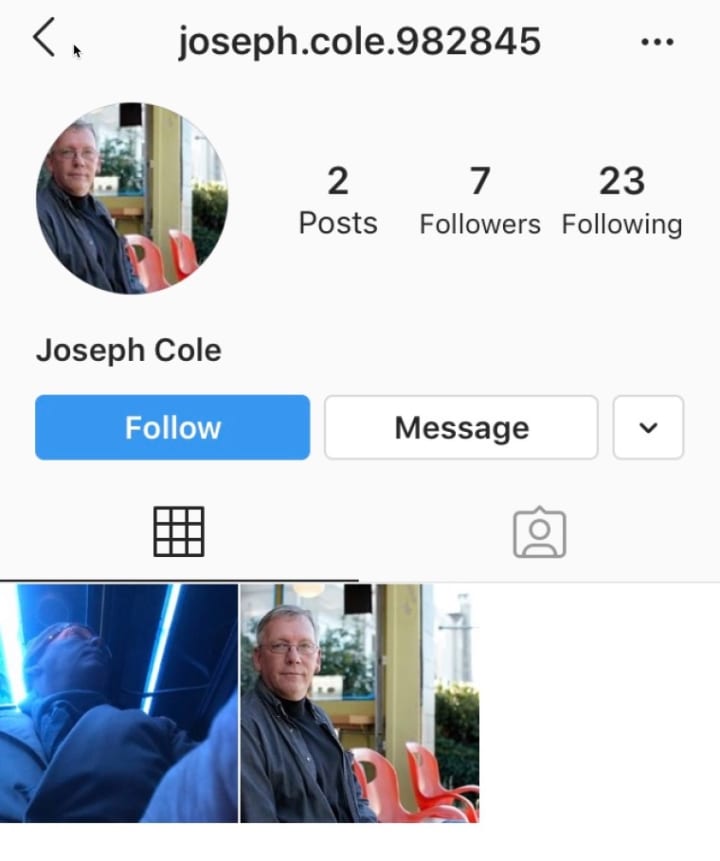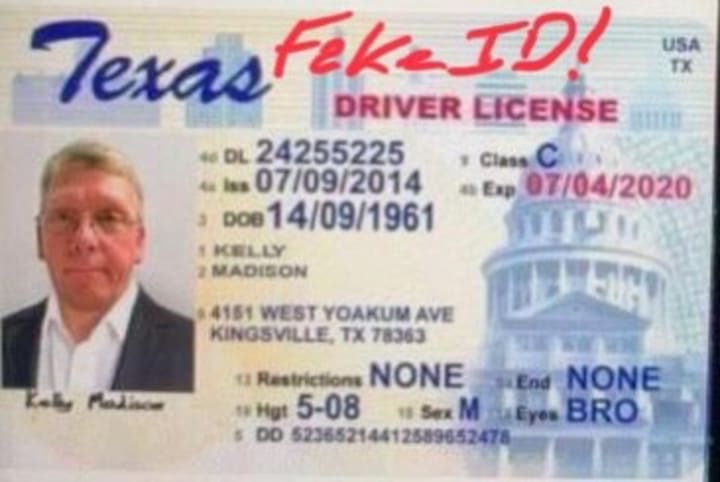It's Not Me!
Fake accounts on social media and how to stay safe.

I'm a writer, a published book author, and a technologist. As such, I have a web site, and I use various social media channels for my marketing. In the industry, we call it "branding." My name is my brand. Unfortunately, my face is not my brand. I do not need my face to be a part of my branding. I want people to know me for my words and my stories. They don't need to know what I look like to enjoy my books.
However, in the world of social media, I'm discovering how vital and dangerous, pictures of my face can be.

[Picture of a fake Instagram account]
"She gave him $15,000!"
One of my followers on Instagram reported a fake account using my pictures. My followers are quite helpful in identifying these bogus accounts, and on average, I report between 3 to 7 accounts per week. Usually, they are removed by the Instagram support staff within 24 to 48 hours. Unfortunately, it could be months before I become aware of an account using my pictures, and during that time, the damage is done.
Scammers love to create fake accounts on social media. They use these accounts to get friendly with others, hoping to find someone willing to engage them in a conversation. Then they "work" that person, establishing a personal relationship and learning enough about their target to determine the best way to scam some money. Sometimes it's a promise to meet face-to-face, only to be canceled due to some emergency, which requires money to overcome. Or it's a sick child, a medical emergency, a victim of a crime, or one of many dozens, if not hundreds, of stories. If someone loses a couple of hundred dollars, or a thousand, I feel that is the price of not being vigilant - a harsh lesson learned. But when I hear of someone losing some "serious" money, it makes me sick.
Why My Pictures?
Why me? Maybe I have a friendly face. I do tend to look for the best in people, and I've been known to extend myself to help a dear friend or family member. Maybe that comes across in how I look, and that is why the scammers choose my pictures. I don't know. I'm not an expert in this, but I am quickly learning some of the warning signs.
What to Watch For
First off, if the profile for the account does not look right or feel right, then chances are it's a fake account quickly thrown together by the scammer. I have heard that a single person will be juggling 20 accounts or more, looking for a target.
The ID name is another indicator. One of the traits I have noticed is the use of two first names, followed by four or more numbers. For example, billtom_8493. Not a real account, but is an excellent example of a large number of fake accounts I have seen.
Low follower counts, only 3 to 9 posts, and following hundreds or more than a thousand is another good indicator. Think of the scammers. They need to create 20 or more accounts and then develop a whole bunch of potential targets. Possibly log into another six accounts and follow the new account to try and make it look valid. Then they make up a brief profile description to try and match the interests of the planned targets. Maybe groups that are known to take care of their own, such as a religious group, or college fraternity, and include some related hashtags. Many times I've noticed that the posts or pictures on the account do not fit the profile's audience.
The scammer will send a direct message (DM) or chat with something like, "How are you doing?" Or "Where are you from?" It is usually concise. Remember, they have a lot of accounts they're juggling, and they're throwing hooks into the water and looking for bites. If you respond with an answer, then you will get more involvement from the scammer, and the con begins.
Do The Research
If you do get a request from someone who looks like a valid account and they pique your interest, do your research. Is there an extensive history of posts? Do their followers look valid? Are they on other social media networks with the same ID? A real person will have a real history, and you'll be able to learn more by searching the other networks and search engines (Google, Bing, etc.).
If you get deep into a conversation and an on-line relationship, do not ever fall for their requests for money, regardless of the reasons. Even if you ask for proof of who they are, they will do everything in their power to pull you in. This picture is a fake ID mocked up to convince someone that they were real. It has my face edited into the ID, and the date is in European format, not in US format. Still, the target was fooled and became a victim.

[Picture of the ID]
If in doubt, ask your family and friends. Even if you feel embarrassed about the on-line relationship, it is not worth becoming a victim.
Responding to Messages
I don't have the time to start a dialog with everyone who wants to talk with me. So, I use a very generic canned response to those "How you doing?" messages.
As an author and public figure, I thank you for wanting to engage in conversation. However, due to my limited time and the effort required to be a successful author, my interactions are limited. Feel free to submit any requests you have regarding my stories and books via my web site at www.timothytrimble.com. Thank you for understanding.
It usually works. Most of the time, they don't try again. If they do, I block the account. Not everyone is a writer, so I've provided the following to my friends and followers who are facing the same problem:
Thank you for wanting to engage in conversation. However, I do not spend time having personal interactions with people I do not personally know. Thank you for understanding.
Other Options
One option I am considering is the use of a watermark on all of my postings, with the name of my real profile ID. It is a bit of extra work, and there's no guarantee that the scammer won't just crop it out of the picture. I don't want to embed a watermark on top of my forehead, but a small but visible indicator of the real account would be helpful. I have also suggested this with the Instagram folks as a possible built-in feature - the option of including a watermark on every post.
Throughout thousands of years, there have been cons, and there have been victims. Each advance in technology brings out a new method of trying to scam people out of their money. Unfortunately, if we're going to utilize the technology, we have to take the time to learn how it works and how we can protect ourselves.
As for me, I want to write and tell stories. I don't want to have to spend time protecting my accounts. But I will, because I use these technologies, and I will continue to educate myself. And if my F4-Team (Friends, Fans, Followers, and Family) want to feel comfortable with interacting with me on social media, then I'll take the time to educate them as well.
Stay vigilant and be safe out there.
Copyright (c) 2020, Timothy Trimble
About the Creator
Timothy Trimble
Timothy is a published author of Science Fiction & Fantasy stories.
His latest novel, "Air Born" can be found at book stores & online. His tips and articles on the life of a writer will continue.
He can be followed at TimothyTrimble.com.






Comments
There are no comments for this story
Be the first to respond and start the conversation.